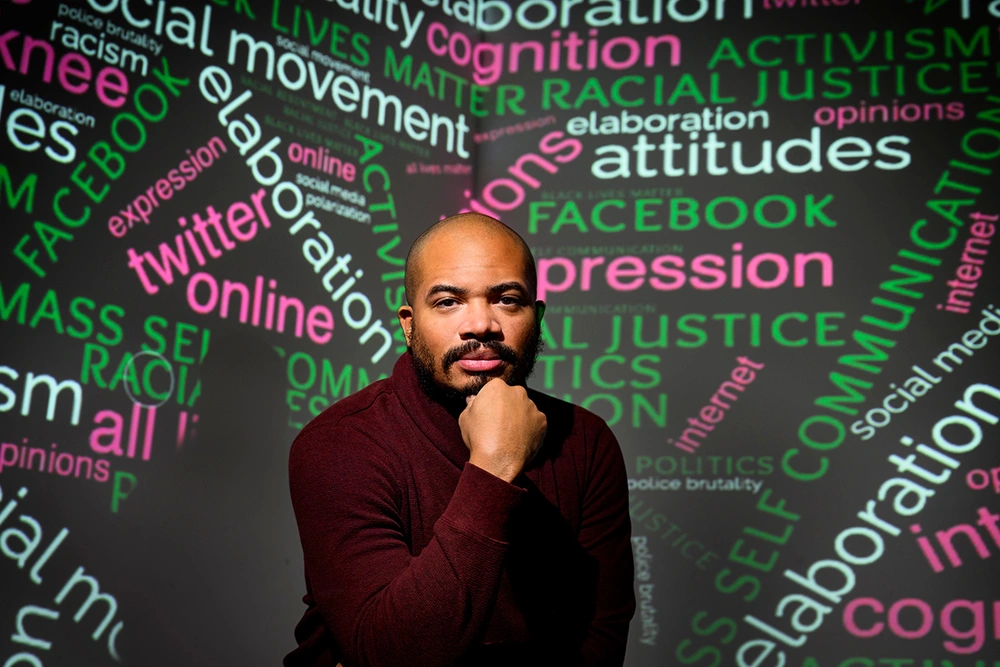
White people surveyed in a recent study indicated they would be more likely to confront those who post racist content on social media if their objective were to defend the norms for political discussions rather than to change the person’s prejudiced beliefs.
Communication professors Stewart M. Coles of the University of Illinois Urbana-Champaign and Daniel S. Lane of the University of California, Santa Barbara surveyed people during the 2020 U.S. presidential election cycle to explore the conditions under which white people would challenge hate speech on social media.
Those in the study were presented with a vignette in which they encountered a racist post on a social media platform and were asked to indicate how likely they would be to confront the author if their goal were to change the person’s beliefs and if it were setting social norms by letting its author know their remarks were unacceptable. The author of the racist remarks in the scenario was randomly assigned to be a close friend, family member, acquaintance, or stranger.
“Overall, we found that reframing the confrontation goal from changing someone’s mind to setting social norms increased participants’ willingness to challenge these types of posts,” Coles said. “Participants also indicated greater willingness to confront someone they were closer to rather than someone who was relationally distant, such as a stranger or acquaintance.”
Published in the journal New Media and Society, the findings suggest that reframing the goal of the interaction from changing the offender’s beliefs to setting the norms and expectations for content could induce more people to challenge such posts.
Norm-setting changes the nature of the social media environment, eroding the social power that allows users to disseminate racist ideology, the researchers said.
It also was an appealing strategy for two groups of people in the study – those who were the most cynical about the value of discussing political issues such as race and those with the greatest reluctance to challenge offensive content posted by relationally distant users such as strangers and acquaintances, the researchers found.
Some research has shown that challenging hate speech and racist stereotypes posted online reduces the odds that offenders will repeat it. However, the hostility and entrenched viewpoints that permeate online communities, as well as widespread cynicism about politics in general and the likelihood of changing others’ beliefs about race through online discourse may discourage users from objecting to racist content, according to the study.
“However, if the objective is reframed from trying to change a transgressor’s deep-seated attitudes to a potentially more achievable goal – that of defining the social norms for political discussions – participants’ willingness to confront others about racist content increases,” Coles said.
A sample of 1,350 people was recruited through the research firm YouGov in two waves between September and November 2020 during the U.S. general election period. The study focused on the 719 white participants who completed both waves and reported using social media.
The sample contained similar numbers of Democrats (37%), Republicans (30%), and those who identified as Independents or other political affiliations (32%), according to the study. Demographically, the participants’ median age was slightly greater than 53 years. About 56% of them were female, the majority had some college education and their median income was between $50,000 and $69,000.
Using 5-point scales where 1 was “not at all likely” and 5 was “extremely likely,” participants rated their probability of responding to a racist post with two goals: changing the author’s mind and setting norms by telling the author their remarks were unacceptable.
Using similar scales, participants rated their level of interest in politics, their expectations of changing someone’s mind by discussing political issues, and how productive they believed such discussions to be. Using a 7-point scale, participants rated themselves on how well they thought they understood the country's important political issues and how qualified they believed they were to participate in politics.
Those in the study were asked which social media platforms – including Facebook, TikTok, and Snapchat – they used during the past 30 days and how frequently they used them.
To control for attitudes toward groups that might be affected by racism, participants’ perceived sense of closeness to Black and Hispanic people was assessed on a 5-point scale, ranging from “not very close” to “extremely close.”
Some studies have shown that white people may have “unique communicative power to fight against racism on social media,” reducing the number of prejudiced remarks and stereotypes posted by those they confront, Coles and Lane wrote.
With fiery comments about societal problems such as immigration, antisemitism, and police officers’ treatment of minorities commonplace on social media, there is a critical need for interventions that empower people to challenge online hate speech because it is intricately tied with perpetuating structural racism and acts of racial violence, Coles said.
“Framing the confrontation goal as norm-setting may spur white social media users to step up rather than stand by,” he said. “This may change the social power dynamics online, instead of trying to convince racist users to behave better out of the goodness of their own hearts.”
Editor's note: This story was originally published by the University of Illinois News Bureau.